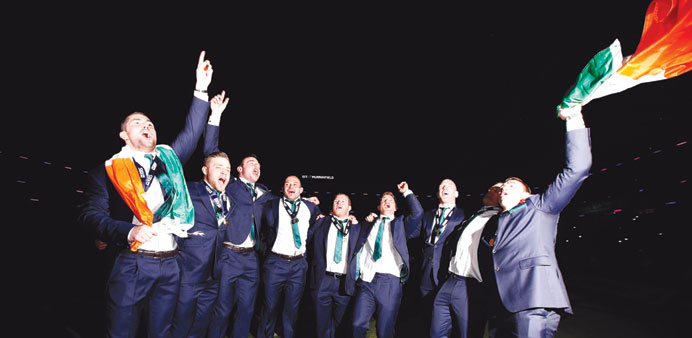Reuters/London
A Six Nations championship retained on points difference by Ireland left few clues as to which of the northern hemisphere’s leading lights are best equipped to mount a sustained World Cup challenge later this year.
Ireland, England and Wales all have reason to feel confident of a deep run in the global showpiece after a Six Nations that began with a laser show in the Millennium Stadium and ended with fireworks on the pitch in Rome, Twickenham and Murrayfield.
A final-day tryfest, more reminiscent of a sevens tournament, provided a spectacular climax with the outcome in doubt right up until the final whistle at Twickenham where England came up six points short of overhauling Ireland despite putting up 55 points against France.
Ireland, who like England and Wales finished with four wins from five, again showed what a well oiled green machine they have become under head coach Joe Schmidt.
The New Zealander is a clever strategist and has a side at his disposal who, with enigmatic flyhalf Johnny Sexton at the pivot, can adapt their game to suit Schmidt’s meticulous planning.
Ireland’s ability to go through phase after phase at speed, forcing a retreating defence into conceding penalties, was at the core of their 10-match winning run until their grand slam hopes came unstuck in Cardiff against terrific Welsh resistance.
Accused of playing a “turgid” game by former England scrumhalf Austin Healey, Ireland showed they could shake off the shackles by running in four tries against Scotland on Saturday, doubling their quota for the tournament. England, runners-up for a fourth consecutive season, were comfortably the leading try scorers, finishing with 18 and had arguably the player of the tournament in outside centre Jonathan Joseph.
Riddled by injuries before the start, England showed a clinical side to their attacking game with George Ford improving rapidly in the key number 10 position alongside Ben Youngs. But they also showed also worrying lapses in defence, not least in conceding three tries to Italy at Twickenham.
England endured a chastening defeat in Dublin when they had no answer to Ireland’s aerial bombardment but World Cup-winning coach Clive Woodward believes Stuart Lancaster has a side at his disposal than can emulate his 2003 champions.
“England were fantastic (on Saturday) and if they can draw from the experience, this can be a fantastic year for English rugby—and indeed British and Irish rugby—because Wales and champions Ireland were quite exceptional on the final day of the tournament,” Woodward wrote in the Mail on Sunday.
“England cut loose last night in thrilling fashion and their players will never quite be the same again. They know for certain there is another level they can perform to and the Twickenham crowd know that as well.”
Wales coach Warren Gatland is quietly confident that his side are on the right path after they recovered from an opening defeat by England to win their next four games, culminating with a 61-20 demolition of Italy.
The Welsh rediscovered in Rome their attacking verve that made them back-to-back Six Nations winners in 2012 and 2013 and Gatland has no fears of not qualifying from their World Cup group which includes England and Australia.
“I have said about the World Cup and momentum and gaining confidence,” Gatland said.
“There is no fear about playing England at Twickenham or Australia as well because we know we will be in good shape as long as everyone stays fit and clear of injuries.”
France once again endured a disappointing campaign that yielded just two wins and coach Phillipe Saint-Andre appears no more settled on his half-back pairing than when he first took charge. He chopped and changed again throughout the tournament, flyhalf Camille Lopez partnering Rory Kockott, Morgan Parra and Sebastien Tillous-Borde.
Italy at least had the consolation of avoiding the wooden spoon, a fate that fell to Scotland who lost all five games—leaving New Zealander Vern Cotter to reflect on a Six Nations whitewash in his first season in charge.

Ireland players celebrate after winning the Six Nations championship at Murrayfield in Edinburgh on Saturday. (AFP)
